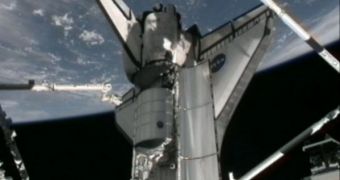The four astronauts of Atlantis' STS-135 crew, aided by the six members of Expedition 28 to the International Space Station (ISS) have begun unloading large amounts of supplies from the space shuttle, and stacking them neatly inside the orbital lab.
The effort began today, July 11. The orbiter is carrying a large Multi-Purpose Logistics Module (MPLM) called Rafaello, which contains thousands of pounds of supplies, spare parts, scientific experiments, food, water and personal items for the ISS.
Most of these supplies are destined to cover the necessities of upcoming ISS crews for as much as a year. There are no extravehicular activities (EVA) planned for Atlantis' crew during this mission, but the ISS crew will conduct a spacewalk during the shuttle's 12-day mission, on Tuesday, July 12.
In order to unpack the cargo on Rafaello with maximum efficiency, astronauts used the station's robotic arm to pluck the MPLM from Atlantis' cargo bay, and temporary attached it to the Earth-facing port of an ISS connection node.
Canadarm-2 maneuvers began at around 5 am EDT (0900 GMT) this morning. After Rafaello is attached to its temporary home, it will remain at that location until the orbiter leaves the ISS. Atlantis is expected to return home on Wednesday, July 20.
There are about 9,500 pounds (4,300 kilograms) of cargo packed inside the cargo module, and getting all of them out in time is a massive challenge for the ten astronauts. After unloading is complete, the crew will refill Rafaello with thrash and other unneeded items.
At this point, NASA mission controllers are analyzing the possibility of extending Atlantis' stay for another day. There are many aspects to consider, but such an extension would give the joint crew more time to rest and finish up their chores.
At the same time, flight controllers are keeping an eye on a piece of space junk, that could potentially pose a threat to the two spacecraft as they are orbiting hundreds of kilometers above the planet.
The object is scheduled to make its closest approach on Wednesday, so experts need to refine its trajectory further. If the situation demands it, the shuttle and the ISS may boost their orbit in one direction or another, so as to avoid the incoming space debris, Space reports.

 14 DAY TRIAL //
14 DAY TRIAL //